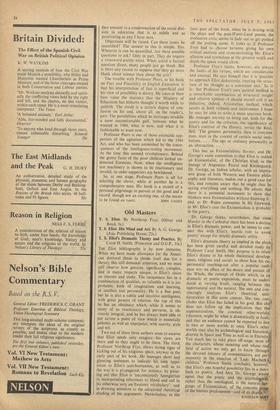Old Masters
T. S. Elioes Dramatic Theory and Practice. By Carol H. Smith. (Princeton and O.U.P., 35s.) THE Eliot bibliography is , by now immense. When we have made allowance for the Ameri- can doctoral thesis (a theme itself due for a thesis), this still demands attention, and we must still observe how genuine, significant, complex, and in many respects unique, is Eliot's claim on interest and study. The uniqueness .lies in a combination of qualities, as valuable as it is im- probable, both of imagination and learning, of intellect and personality. He is a fine poet, but he is also a subtle and intuitive intelligence, with great powers of relation. On top of this he has an obstinacy which, while it seems to many of us reactionary and perverse, is ob- viously integral; and he has always been able to put across a point of view which is essentially polemic as well as unpopular, with suavity, style and wit.
Two out of these three authors seem to assume that Eliot needs only exegesis—his views are there and so they ought to be there. The third, Professor Northrop Frye, shows strong signs of kicking out of his exiguous space, anyway in the early part of his book. He manages short and glancing sentences to indicate his Own Oppo- sition to Eliot's anti-humanism, as well as to the way it is propagated; for instance, by point- ing out that Eliot is 'unconsciously Spenglerian in incorporating references to blood and soil in his otherwise very un-Teutonic vocabulary': and in drawing attention to the occasional rhetorical shading of his arguments. Nevertheless, in the later part of the book, when he is dealing with the plays and the post-Waste-Land poems, the evaluative critic seems to fade out or get pushed off the jostling scene. It looks as if Professor Frye had to choose between giving his own critical analysis and cross-sectioning Mr. Eliot's' allusion and symbolism at the greatest width and depth the space would allow.
Professor Frye's faults, however, are always the faults of his virtues, which are considerable and unusual. He says himself that it is 'possible to approach Eliot deductively, treating the struc- ture of his thought as a consistent unit.' So it is: but Professor Frye's own natural method is a remarkable combination of structural insight and allusive aptness—I should myself call it an inductive, indeed, Aristotelian method, which results in both richness and incisiveness. I hope he may be able to write a more spacious book. He manages anyway to bring out, both for the poetry and for the criticism, the significance of Eliot's contrast of the illusory, versus the Real, Self. 'The genuine personality then is concrete man, man in the context of certain social insti- tutions. . . . The ego or ordinary personality is an abstraction. . .
This has an Existentialistic flavour, and Dr. George's main contention is that Eliot is indeed an Existentialist, of the Christian kind, in the lineage of Augustine, Pascal and Kierkegaard. Dr. George, an Indian scholar, with an impres- sive grasp of both Western and Eastern philo- sophy and literature, makes out a good case for this, and remains aware that he might thus be saying everything and nothing. He admits that there is a perennial movement to show that thinkers were Existentialists without knowing it: and, as Dr. Rajan comments in his foreword, in Mr. Eliot's case the Existentialism is probably in the poetry.
Dr. George thinks, nevertheless, that since Murder in the Cathedral there has been a decline in Eliot's dramatic power, and he seems to con- nect this with Eliot's 'ascetic rule to avoid
poetry' except for strictly dramatic utility. ' Eliot's dramatic theory as implied in the playsi
has been given careful and detailed study by Professor Carol Smith. Her purpose is to relate Eliot's drama to his whole theoretical develop- ment, religious and social; to show how his perimental reaching-out after a popular audi-1 ence was an effect of his desire and pursuit of the Whole, the concept of Order which, in it dramatic or poetic expresSion, must be underL stood at varying levels, ranging between the supernatural and the natural. She sees and con- vincingly analyses Eliot's theatrical anti- naturalism in this same context. She, too, conii,1 eludes that Eliot has failed in his goal. But sh does not follow up the implication that thei-.5 supernaturalism, the constant other-worldly rAerence, might be what is dramatically at fault, and that an audience cannot be expected to live in two or more worlds at once. Eliot's other worlds may also be archieological and historical discrete in Space and Time as well as in Eternity Too much has to take place off-stage; most o the characters, whose meaning and whose rea field of action we only get to know throug the devoted labours of commentators, are per manently in the situation of 'Lady Macbeth' children.' Professor Smith concludes, however, that Eliot's one hopeful possibility lies in a move back to poetry. And here Dr. George would agree that the poetic and the psychologicA, rather than the ontological, is the natural lan- guage of Existentialism, of the concrete ,sege of the human predicament—and of its drantaYrY






































 Previous page
Previous page